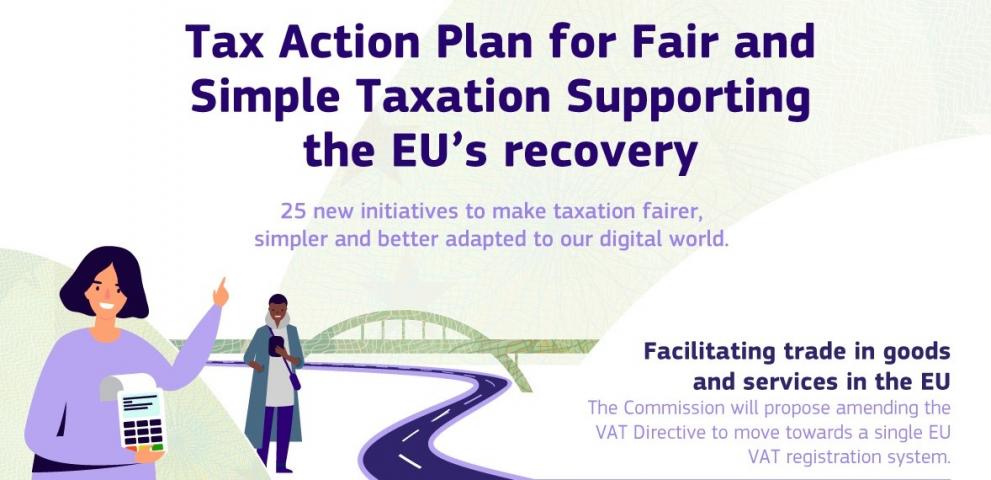Is íogair an cheist í ceist na cánach – ní maith le duine ar bith a bheith á híoc, ach ní mór sin a dhéanamh ionas go mbeidh seirbhísí agus infreastruchtúr riachtanach ar fáil dúinn.
Níl duine ar bith inár measc nach n-íocann cáin ar bhealach éigin, más ina dhealú óna chuid tuarastail é, ina íocaíocht bhliantúil leis na Coimisinéirí Ioncaim, nó ina chuid den phraghas a ghearrtar ar earraí ina Cháin Breisluacha (CBL), nó ina dhleachtanna stampaí, cuir i gcás.
Ní dóigh leis an gCoimisiún Eorpach gur gá na córais chánach atá ag na Ballstáit a chur i gcomhréir le chéile go mór ar fud an Aontais Eorpaigh.
Dála na mBallstát eile, is faoi Éirinn atá sé córas cánach dá cuid féin a roghnú, ach tá méid áirithe comhordaithe de dhíth le cinntiú go mbainfidh saoránaigh agus gnólachtaí tairbhe iomlán as an Margadh Aonair.
Tá Straitéis Aontais maidir le Beartas Cánach dírithe ar bhacainní cánach ar gach gníomhaíocht eacnamaíoch trasteorann a bhaint, ar deireadh a chur le hiomaíocht dhíobhálach cánach, agus ar an imghabháil agus seachaint cánach a chomhrac.
Green Taxation
The European Green Deal sets out ambitious targets to tackle climate change and transform Europe into a climate-neutral continent by 2050.
Green taxation can play an active, positive role in achieving this ambition through energy taxes on fossil fuels like diesel, petrol, coal and natural gas.
Applied fairly, green taxes encourage a switch to cleaner energy sources and mitigate resource waste and damage to the environment.
Green taxation can also help promote sustainable growth and maintain tax revenue levels for EU Member States, potentially allowing them to cut other taxes, such as those on labour.
The Commission encourages Member States to design appropriate green taxes that address specific national environmental issues and target those who pollute or waste the most.
Ireland’s proposed Climate Action and Low Carbon Development bill includes a legal requirement for the Irish Government to adopt a series of economy-wide five-year carbon budgets.
The transition towards climate neutrality can’t be achieved by taxation alone, but used with other incentives such as subsidies, investment in public infrastructure and support for low-income households, green taxes can help Europe reach its climate targets.
Commission study on taxation in support of green transition
Fair and simple taxation

The European Commission has adopted an ambitious Tax Package to ensure that EU tax policy supports Europe's economic recovery and long-term growth.
The Package for Fair and Simple Taxation is made up of three initiatives aimed at simplifying tax rules, removing tax obstacles and clamping down on unfair tax competition.
“We need to make life easier for honest citizens and businesses when it comes to paying their taxes, and harder for fraudsters and tax cheats.”
Paolo Gentiloni, Commissioner for Economy.
It includes a Tax Action Plan that will see 25 measures implemented between now and 2024 to make tax simpler and more suited to the modern economy.
The package is designed to ensure that EU tax policy supports Europe's long-term growth and economic recovery from the Covid-19 pandemic.
EU legislation already has exceptional customs and tax tools that can be used in an emergency. These allowed the European Commission to waive customs duties and VAT on the import of medical equipment from non-EU countries until the end of 2021 as part of its response to the coronavirus.
Package for fair and simple taxation
Value Added Tax

In principle, everything we buy includes VAT in the price and while it’s a useful way of funding political objectives such as schools, roads and healthcare the current rules are overcomplicated, out of date and too restrictive.
Each EU Member State decides exactly what VAT rate to charge within an agreed legal framework, but this means goods and services can have different VAT rates applied to them based on where you are in the EU.
Disproportionate VAT compliance costs are often an obstacle to growth for SMEs, while wealthy individuals and big companies sometimes circumvent the EU's VAT rules to avoid paying their fair share of tax.
VAT avoidance schemes can even be used to finance criminal organisations, including terrorists.
The European Commission wants to overhaul VAT rules and in 2016 proposed an Action Plan on VAT that includes creating a single EU VAT area.
Progress has been made on VAT reform and a new VAT scheme for small businesses aimed at reducing red tape and creating a level playing field for SMEs regardless of where they are based in the EU will apply from 1 January 2025.
VAT rules on cross-border e-commerce activities are also changing from 1 July 2021 to overcome barriers to cross-border online sales.
Questions and Answers on VAT reform in the EU
Corporate Tax
Ireland’s corporate tax rate is amongst the lowest in Europe, and it can only be changed by the Irish Government. However, the global tax landscape is changing and reforms are needed to address challenges arising from the digitalisation of the international economy.
The European Commission is pushing for progress on a Common Consolidated Corporate Tax Base (CCCTB), which would see a single set of rules to calculate the taxable profits of companies based in the EU.
The CCCTB would provide a level-playing field between all companies, maintaining the EU’s competitiveness in the global marketplace, avoiding unnecessary administrative complexity and providing tax certainty.
The reform of cooperate tax is an international topic and over 135 countries and jurisdictions are collaborating on measures to tackle tax avoidance strategies used by some multinational enterprises.
This multilateral approach through the OECD/G20 Inclusive Framework on Base Erosion and Profit Shifting will help inform both Ireland’s and the European Union’s future approach to cooperate tax.
OECD/G20 Inclusive Framework on Base Erosion and Profit Shifting
Customs

The EU Customs Union is an essential element in the functioning of the single market. It allows for the application of a uniform system for handling the import, export and transit of goods under a common set of rules.
The withdrawal of the UK from the European Union has provided an example of the complexities involved for businesses and citizens buying and selling goods from a non-EU country.
The Customs Union facilities legitimate trade across Europe and protects against smuggling, trafficking, counterfeit goods and piracy.
Customs duties are also a source of income for the EU and its Member States, with €26.7 billion collected in 2019.
The EU has signed more than 50 international agreements providing for customs cooperation with 80 countries to simplify and harmonise customs procedures, which in turn reduces the administrative burden and costs for European companies.
Latest taxation news

- News article
The European Commission has proposed a Directive ensuring a minimum effective tax rate for the global activities of large multinational groups.
- Am léitheoireachta: 3 nóiméad

- News article
The Communication on Business Taxation for the 21st century aims to promote a robust, efficient & fair business tax system in the EU.
- Am léitheoireachta: 1 nóiméad
